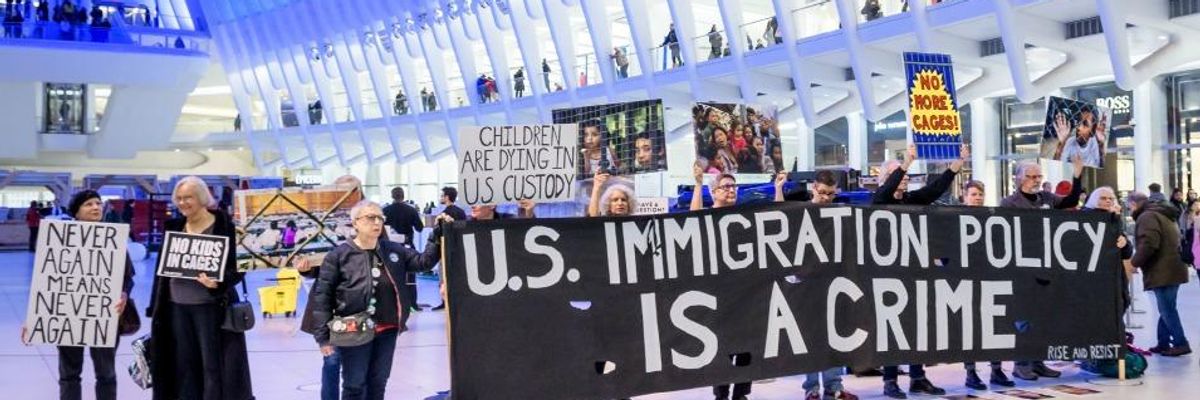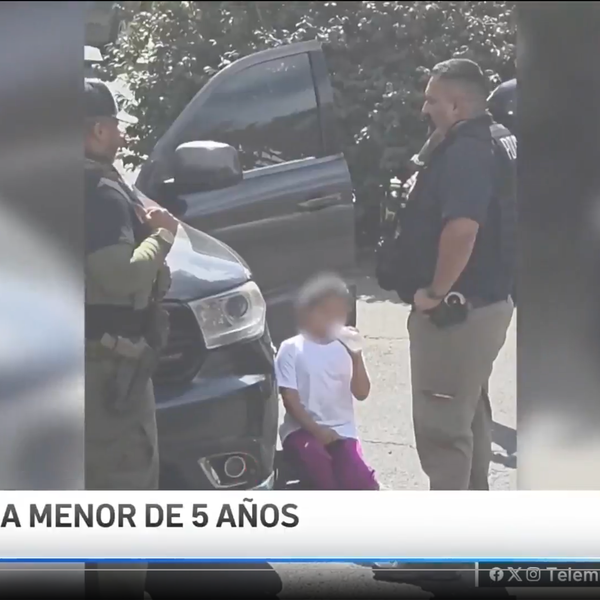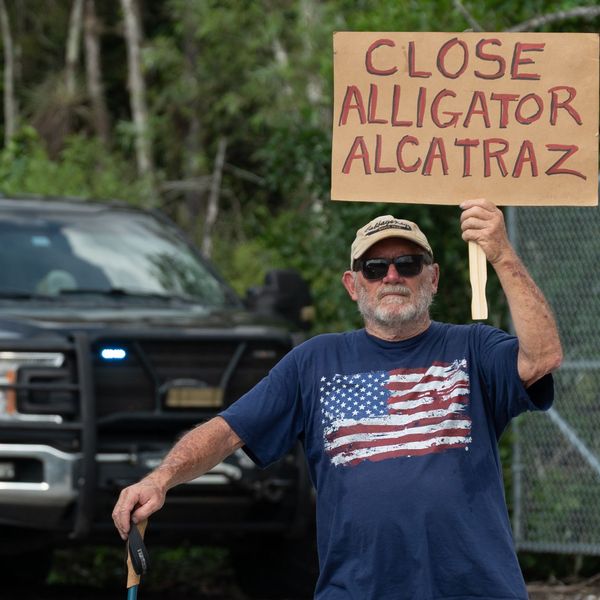
Protesters holding a banner reading, "U.S. Immigration Policy Is A Crime" at a silent protest in January 2020. (Photo: Erik McGregor/LightRocket via Getty Images)
Cuban Asylum Seeker Describes Vicious Pepper Spray Attack on Hunger Strikers at ICE Detention Facility
More than 2,000 migrants and refugees in U.S. detention facilities have contracted Covid-19 as advocates demand their release.
A Cuban asylum-seeker on Thursday described a "shocking" pepper spray attack he and about two dozen other people on hunger strike faced in May at a private prison where ICE is holding immigrants in New Mexico.
On May 14, the migrants were several days into a hunger strike over poor treatment, including "terrible food" served at Torrance County Detention Facility near Albuquerque. The men were protesting unhealthy prison conditions which they feared made them more vulnerable to contracting Covid-19.
An official at the prison, which is run by private contractor CoreCivic, entered the room where the men were striking and warned them the situation was "going to get ugly" unless they ended the protest.
"The officer sprayed me directly on my face and on my body, and I ran. I felt like I was going to drown."
--Yandy Bacallao, Cuban refugee
Moments later, guards clad in riot gear and gas masks came in with pepper spray canisters, corralled the men into a group and sprayed them with the chemical.
"You could just hear everyone screaming for help," Yandy Bacallao, who arrived in the U.S. last November from Cuba seeking political asylum, like many of the men who were attacked.
A CoreCivic spokesperson acknowledged that the pepper spraying had happened and said it was in response to a protest that "became disruptive" as the migrants refused to follow verbal orders.
But the men who spoke to The Guardian and the independent news organization Searchlight New Mexico suggested the orders they were refusing to follow pertained to eating the facility's food.
"The officer sprayed me directly on my face and on my body, and I ran," Bacallao said of the attack. "I felt like I was going to drown."
According to The Guardian, immigrants in detention centers in Massachusetts, California, and Texas have also been pepper sprayed in response to protests since the coronavirus pandemic began.
Public health experts in recent weeks have raised alarm over the use of pepper spray and tear gas by police at racial justice protests taking place outside; both chemical sprays can cause people to cough, making the transmission of Covid-19 more likely.
According to the New Mexico Department of Health, at least 32 people in Torrance County Detention Facility have contracted the virus so far.
The hunger strike was one of many direct actions since the pandemic began demanding migrants in detention facilities be released to stem the spread of the virus. As of June 16, according to the Center for Migration Studies, at least 2,059 immigrants and refugees have contracted Covid-19 in U.S. detention facilities.
Last week, a federal judge ordered the administration to release children from the country's three family detention centers, in light of the pandemic.
Although Bacallao reported experiencing temporary blindness and being in pain for at least an hour after being pepper sprayed, medical staff at the facility determined that "no injuries occurred" during the attack.
An official for Torrance County, which received more than $90,000 in payments from CoreCivic's facility last year, also denied Bacallao's version of events.
Bacallao told Searchlight New Mexico that he fled Cuba as a refugee seeking a better life, but has been treated terribly since arriving in the United States.
"When I come here to the United States, to the freest country in the world, the first thing they do is imprison me," Bacallao said.
An Urgent Message From Our Co-Founder
Dear Common Dreams reader, The U.S. is on a fast track to authoritarianism like nothing I've ever seen. Meanwhile, corporate news outlets are utterly capitulating to Trump, twisting their coverage to avoid drawing his ire while lining up to stuff cash in his pockets. That's why I believe that Common Dreams is doing the best and most consequential reporting that we've ever done. Our small but mighty team is a progressive reporting powerhouse, covering the news every day that the corporate media never will. Our mission has always been simple: To inform. To inspire. And to ignite change for the common good. Now here's the key piece that I want all our readers to understand: None of this would be possible without your financial support. That's not just some fundraising cliche. It's the absolute and literal truth. We don't accept corporate advertising and never will. We don't have a paywall because we don't think people should be blocked from critical news based on their ability to pay. Everything we do is funded by the donations of readers like you. Will you donate now to help power the nonprofit, independent reporting of Common Dreams? Thank you for being a vital member of our community. Together, we can keep independent journalism alive when it’s needed most. - Craig Brown, Co-founder |
A Cuban asylum-seeker on Thursday described a "shocking" pepper spray attack he and about two dozen other people on hunger strike faced in May at a private prison where ICE is holding immigrants in New Mexico.
On May 14, the migrants were several days into a hunger strike over poor treatment, including "terrible food" served at Torrance County Detention Facility near Albuquerque. The men were protesting unhealthy prison conditions which they feared made them more vulnerable to contracting Covid-19.
An official at the prison, which is run by private contractor CoreCivic, entered the room where the men were striking and warned them the situation was "going to get ugly" unless they ended the protest.
"The officer sprayed me directly on my face and on my body, and I ran. I felt like I was going to drown."
--Yandy Bacallao, Cuban refugee
Moments later, guards clad in riot gear and gas masks came in with pepper spray canisters, corralled the men into a group and sprayed them with the chemical.
"You could just hear everyone screaming for help," Yandy Bacallao, who arrived in the U.S. last November from Cuba seeking political asylum, like many of the men who were attacked.
A CoreCivic spokesperson acknowledged that the pepper spraying had happened and said it was in response to a protest that "became disruptive" as the migrants refused to follow verbal orders.
But the men who spoke to The Guardian and the independent news organization Searchlight New Mexico suggested the orders they were refusing to follow pertained to eating the facility's food.
"The officer sprayed me directly on my face and on my body, and I ran," Bacallao said of the attack. "I felt like I was going to drown."
According to The Guardian, immigrants in detention centers in Massachusetts, California, and Texas have also been pepper sprayed in response to protests since the coronavirus pandemic began.
Public health experts in recent weeks have raised alarm over the use of pepper spray and tear gas by police at racial justice protests taking place outside; both chemical sprays can cause people to cough, making the transmission of Covid-19 more likely.
According to the New Mexico Department of Health, at least 32 people in Torrance County Detention Facility have contracted the virus so far.
The hunger strike was one of many direct actions since the pandemic began demanding migrants in detention facilities be released to stem the spread of the virus. As of June 16, according to the Center for Migration Studies, at least 2,059 immigrants and refugees have contracted Covid-19 in U.S. detention facilities.
Last week, a federal judge ordered the administration to release children from the country's three family detention centers, in light of the pandemic.
Although Bacallao reported experiencing temporary blindness and being in pain for at least an hour after being pepper sprayed, medical staff at the facility determined that "no injuries occurred" during the attack.
An official for Torrance County, which received more than $90,000 in payments from CoreCivic's facility last year, also denied Bacallao's version of events.
Bacallao told Searchlight New Mexico that he fled Cuba as a refugee seeking a better life, but has been treated terribly since arriving in the United States.
"When I come here to the United States, to the freest country in the world, the first thing they do is imprison me," Bacallao said.
A Cuban asylum-seeker on Thursday described a "shocking" pepper spray attack he and about two dozen other people on hunger strike faced in May at a private prison where ICE is holding immigrants in New Mexico.
On May 14, the migrants were several days into a hunger strike over poor treatment, including "terrible food" served at Torrance County Detention Facility near Albuquerque. The men were protesting unhealthy prison conditions which they feared made them more vulnerable to contracting Covid-19.
An official at the prison, which is run by private contractor CoreCivic, entered the room where the men were striking and warned them the situation was "going to get ugly" unless they ended the protest.
"The officer sprayed me directly on my face and on my body, and I ran. I felt like I was going to drown."
--Yandy Bacallao, Cuban refugee
Moments later, guards clad in riot gear and gas masks came in with pepper spray canisters, corralled the men into a group and sprayed them with the chemical.
"You could just hear everyone screaming for help," Yandy Bacallao, who arrived in the U.S. last November from Cuba seeking political asylum, like many of the men who were attacked.
A CoreCivic spokesperson acknowledged that the pepper spraying had happened and said it was in response to a protest that "became disruptive" as the migrants refused to follow verbal orders.
But the men who spoke to The Guardian and the independent news organization Searchlight New Mexico suggested the orders they were refusing to follow pertained to eating the facility's food.
"The officer sprayed me directly on my face and on my body, and I ran," Bacallao said of the attack. "I felt like I was going to drown."
According to The Guardian, immigrants in detention centers in Massachusetts, California, and Texas have also been pepper sprayed in response to protests since the coronavirus pandemic began.
Public health experts in recent weeks have raised alarm over the use of pepper spray and tear gas by police at racial justice protests taking place outside; both chemical sprays can cause people to cough, making the transmission of Covid-19 more likely.
According to the New Mexico Department of Health, at least 32 people in Torrance County Detention Facility have contracted the virus so far.
The hunger strike was one of many direct actions since the pandemic began demanding migrants in detention facilities be released to stem the spread of the virus. As of June 16, according to the Center for Migration Studies, at least 2,059 immigrants and refugees have contracted Covid-19 in U.S. detention facilities.
Last week, a federal judge ordered the administration to release children from the country's three family detention centers, in light of the pandemic.
Although Bacallao reported experiencing temporary blindness and being in pain for at least an hour after being pepper sprayed, medical staff at the facility determined that "no injuries occurred" during the attack.
An official for Torrance County, which received more than $90,000 in payments from CoreCivic's facility last year, also denied Bacallao's version of events.
Bacallao told Searchlight New Mexico that he fled Cuba as a refugee seeking a better life, but has been treated terribly since arriving in the United States.
"When I come here to the United States, to the freest country in the world, the first thing they do is imprison me," Bacallao said.

